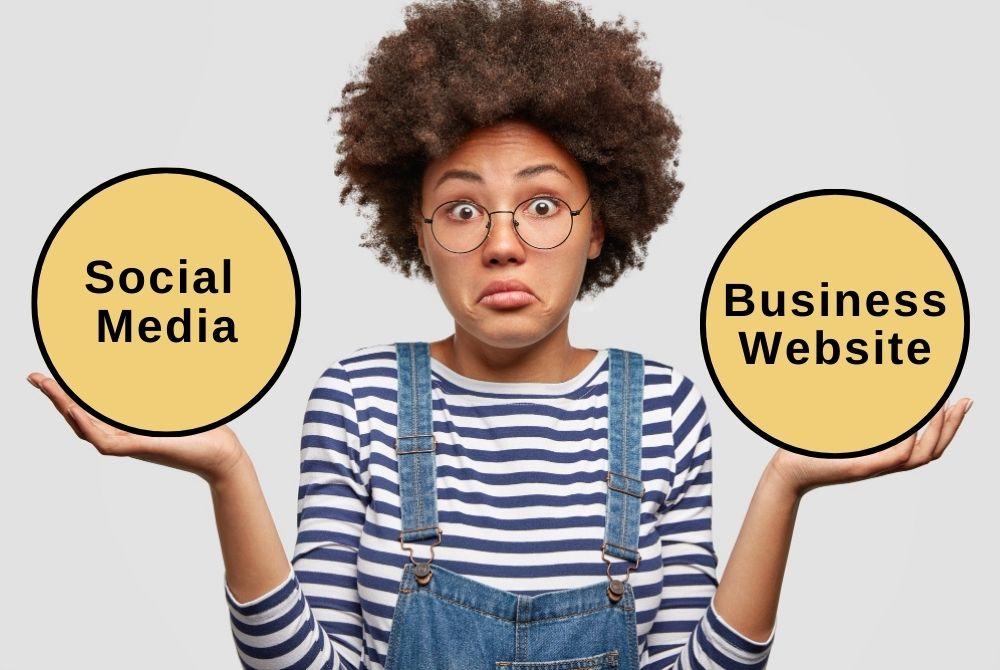What do you think about social media vs websites for businesses?
Many small business owners and digital marketers are often left questioning the most beneficial online path to stake their claim. Social media titans like Facebook, Instagram, and Twitter entice them with their vast audiences, sophisticated ad platforms, and ease of use.
But what about the good old business website—a domain that’s entirely yours, with your rules and your traffic?
Let’s dive into the debate: social media vs. business website, and which one is the front-runner for your business in terms of visibility, engagement, brand control, and long-term growth.
Read: Six Proven Ways to Maximize Your Marketing Efforts
Social Media for Online Marketing
Social media refers to the collective of online communication channels dedicated to community-based input, interaction, content-sharing, and collaboration.
It spans various platforms where users engage in sharing information, ideas, personal messages, and other content, such as photos and videos.
Social media is a space that thrives on connectivity and the fostering of social networks. Hence, it allows individuals from across the globe to build relationships and share experiences in real-time.
A business social media page is used as a dynamic tool to reach target audiences and engage with customers more personally and directly. Businesses use these platforms to promote their brands, products, and services through targeted advertising, organic content sharing, and interactive features like polls and live streams.
With the analytics tools provided by these platforms, marketers can gather valuable data on customer behavior and preferences, allowing for refined and effective marketing strategies. Additionally, social media facilitates direct feedback and customer service opportunities, creating a two-way conversation between businesses and consumers.
Who Benefits From Social Media Marketing?
Businesses that stand to benefit the most from the use of social media are those that aim to engage a broad, diverse audience with visual content and interactive features. This mainly includes B2C companies operating in the lifestyle, fashion, beauty, entertainment, or food industry. It is beneficial for them as they showcase their product’s appeal through vibrant imagery, and video can capture consumer interest.
Moreover, services that require trust-building with customers, such as health, wellness, and professional services, can also benefit significantly. Business social media page allows for personal stories and customer testimonials, which contribute to the brand’s credibility and approachability.
Pros and Cons of Social Media for Business
While social media platforms offer considerable advantages for business marketing, they also come with their own set of challenges. Privacy concerns, algorithm changes, and the transient nature of content are things to consider.
Reliance on these platforms can be risky for businesses as they do not own the platform, and any major changes or mishaps can significantly impact their reach and engagement.
PS- Before delving further into the pros and cons of social media for businesses, it’s essential to understand these challenges and how they can impact your digital strategy.
Pros of Social Media
1. Broad reach: Social media platforms have a massive user base, making it easier to reach a diverse audience.
2. Cost-effective: Many social media tools are free or low-cost, allowing businesses to engage with customers without a significant investment.
3. Instant feedback: Direct interaction with customers provides immediate feedback and insights into consumer behavior.
4. Brand personality: Social media offers a unique opportunity to showcase your brand’s voice and personality in a more informal and approachable way.
Cons of Social Media
1. Time-Consuming: Maintaining an active social media presence requires time and effort to engage with the community and create content.
2. Evolving Algorithms: Dependence on platform algorithms can mean constant adaptation to ensure your audience sees your content.
3. Potential for Negative Exposure: Mistakes or poor customer interactions on social media can quickly escalate and damage your brand’s reputation.
4. Less Control: The platform owns the ground you’re playing on, potentially changing rules or even shutting down with little notice, impacting how you reach your audience.
Business Websites for Online Marketing
A business website serves as the digital storefront for your company. It provides a dedicated online space where information about your business, products, and services is displayed.
Unlike social media, your website is entirely yours to control and personalize, giving you greater flexibility in design, features, and content.
By having a company website, you establish a branded online presence that customers can easily find through search engines. This allows for more targeted marketing efforts as you have complete control over the messaging and visuals that represent your brand.
A business website is typically structured with multiple pages, including
- A homepage,
- About page,
- Product or service listings,
- Contact information,
- And often a blog or resource section.
Unlike social media, a business website is under your complete control, from layout to content, creating an environment consistent with your brand identity.
How To Leverage A Business Website
For online marketing, a business website is paramount as it acts as the central hub of a company’s online presence. It’s where you lead customers to learn more, make purchases, or get in touch.
Marketing efforts can include driving traffic to the site through SEO strategies, email marketing campaigns, and targeted digital ads.
With a well-optimized website, you improve your visibility in search engine results, thereby increasing traffic and potential sales. A website’s analytics provide deeper insights into visitor behavior, enabling data-driven decisions for search engine optimization (SEO) and content strategies. This can allow you to target the right customers.
Through a business website, a company can channel its online marketing efforts effectively in various ways. You can host a blog that drives organic traffic, create landing pages for marketing campaigns, integrate an e-commerce platform for direct sales, and employ lead capture strategies.
By leveraging all these features, a business website can significantly enhance online marketing efforts for any type of company, from small startups to large corporations.
So, while social media is an essential component of digital marketing, it’s crucial not to overlook the value and impact of a well-designed and optimized business website.
Why Is a Business Website Important?
The business website is a powerful tool for establishing credibility, offering an official source of information that customers can trust.
Businesses across various sectors can reap benefits from utilizing a website for online marketing. It is invaluable for those whose offerings are complex and require detailed explanations or customization. This includes B2B enterprises, technology firms, specialized service providers, and industries where customer education is key to the purchasing decision.
For example, a law firm or a consultancy can illustrate their expertise and depth of service through informative articles and case studies on their site.
Moreover, e-commerce businesses stand to gain by directly selling products online, capitalizing on consumers preferring the convenience of shopping from home.
In essence, any business seeking to establish a strong professional image and communicate extensive information about its services or products will find a well-designed website an invaluable asset in its marketing arsenal.
Read: 5 Ways To Make Your Website Work for Your Business
Pros and Cons of a Business Website
First impressions are paramount in marketing. A business website is the cornerstone of an online presence. While it offers the invaluable advantage of full control over your branding and user experience, it also presents unique challenges that require strategic planning and resources.
Pros of a Business Website
1. Full ownership: Unlike social media, a website is wholly owned by the business, ensuring complete control over content and strategy.
2. Credibility and trust: A professional website is often seen as more credible compared to solely having a social media presence.
3. Customization and flexibility: Tailored design and functionality make it possible to create a unique user experience aligned with brand identity.
4. Data ownership: Full access to user data without mediation from third-party platforms can inform better customer relationship management and marketing strategies.
Cons of a Business Website
1. Cost: Upfront and ongoing expenses for development, hosting, and maintenance can be substantial for a high-quality site.
2. Complexity: Requires technical expertise to build, optimize, and secure the website from threats.
3. SEO competition: Gaining visibility through SEO is a long-term endeavor with intense competition.
4. Less natural engagement: Unlike social media, websites don’t come with a built-in audience, which makes initial traffic generation challenging.
Social Media vs. Website For Business: Which Is Best For You?
The answer lies in understanding your specific business goals, resources, and target audience.
Social media excels at reaching and engaging broad audiences, with a knack for community-building and real-time interactions, but can be unpredictable due to platform changes and algorithms.
Conversely, a business or company website is a strong foundation, especially when aiming for long-term growth and branding. Its SEO potential, conversion capabilities, and the control it offers over customer experience are unmatched.
Small businesses often find that a combination of both—a robust business website complemented by a strategic social media presence—strikes the perfect balance. Each one serves a distinct purpose in the digital marketing ecosystem, with the website as the anchor and social media as the sails.
Frequently Asked Questions
It depends on your business goals. While an active social media presence can be high-value for engagement, a website offers a level of professionalism and control over your brand that social media cannot match.
Consider your target audience and the type of content you plan to share. Platforms like LinkedIn are more professional, while Instagram and Pinterest are visual-centric. Don’t spread yourself too thin; quality over quantity is critical.
With the integration of social sharing buttons, live chats, and community forums, a website can mimic certain aspects of social engagement. However, it’s crucial to remember that the two serve different purposes, and hence, their social dynamics also differ.
Success metrics for a website differ from those on social media and generally focus on conversion rates, traffic, and user engagement. Tools such as Google Analytics can track these metrics, providing insights into user behavior and website performance. Key indicators include the number of visitors, the average time spent on the site, and the bounce rate.
But most importantly, it’s about whether the website meets its set objectives—be it sales, sign-ups, or informational reach.
Driving traffic to your website can be fostered through various methods, including search engine optimization (SEO), content marketing, and paid advertising.
SEO involves optimizing your content to appear higher in search engine results, while content marketing is about creating valuable content to attract and retain an audience.
Paid advertising, such as Google AdWords or Facebook ads, can be highly targeted to reach specific demographics. Don’t forget the power of email marketing to encourage repeat visits from existing customers.
Regular updates to your website content are vital to remain relevant and improve SEO. A blog or news section can be updated weekly or bi-weekly to keep the content fresh and engaging. Regular checks and updates for product and service listings, as well as company news, should also be part of the content strategy. Search engines favor websites that are regularly updated, thus increasing the site’s visibility and traffic.
A business website can provide an in-depth look at your products or services beyond the brief overview that social media allows. It can serve as a knowledge base where clients can find resources, guides, and FAQs that provide substantial value.
The website can host a portfolio or case studies, testimonials, detailed product descriptions, and comparison charts—all of which establish credibility and aid in the decision-making process for potential clients.
Conclusion: Strategically Synthesizing Your Online Presence
You may not need to think about comparing social media vs websites for your business. A strong online presence is like a well-done symphony—each element must be harmoniously conducted to deliver a compelling performance.
To orchestrate success, businesses must not only create a resonant online identity but also maintain the flexibility to adapt to new technologies and consumer behaviors. The right digital marketing mix—one that combines the credibility and control of a business website with the engagement and vitality of social media—empowers companies to captivate their audience, nurture leads, and drive growth in an ever-evolving marketplace.
Related Posts:







